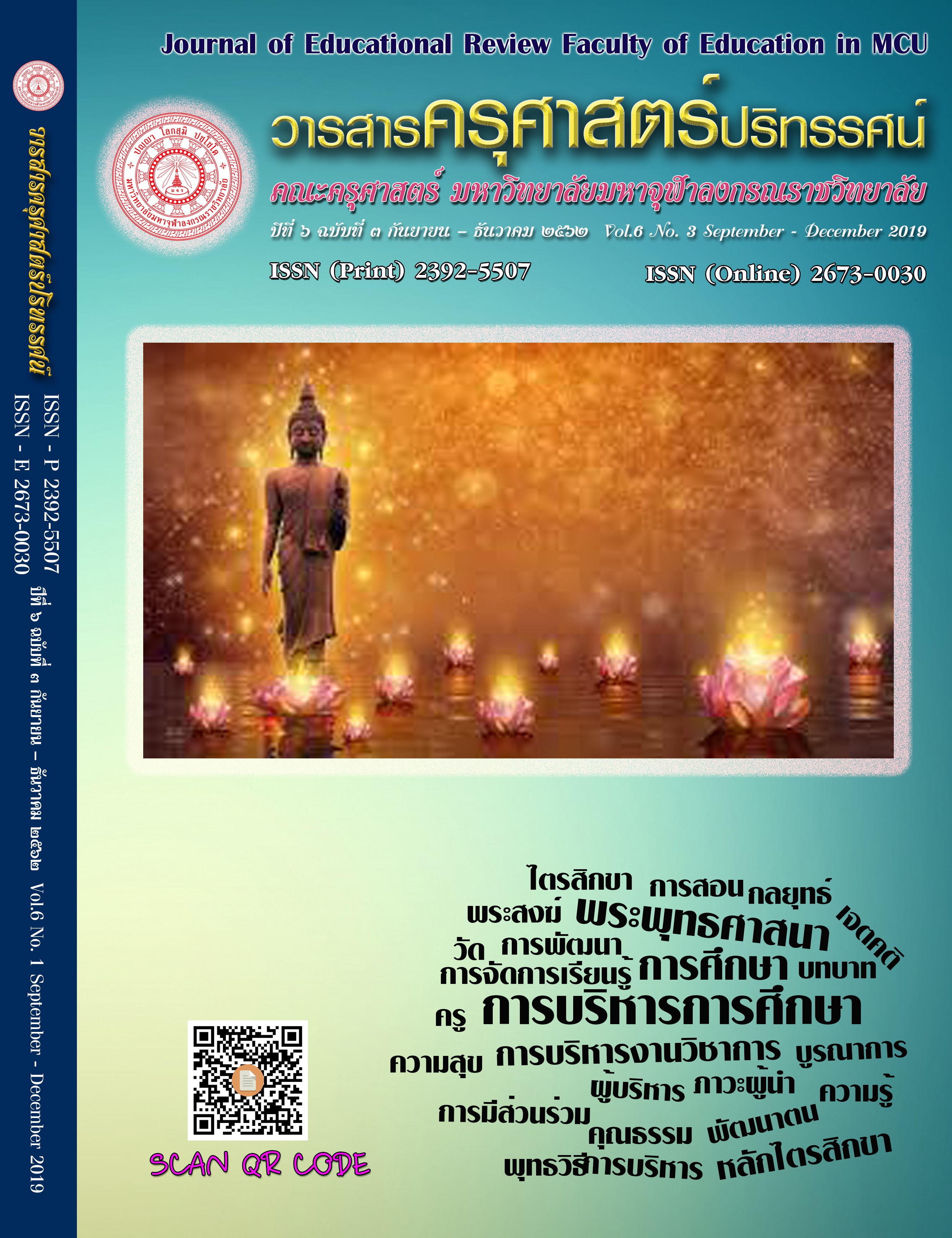THE CAUSAL FACTORS AFFECT SCIENCE PROCESS SKILLS OF PRATHOM SUKSA VI STUDENTS UNDER THE JURISDICTION OF THE AREA SERVICE OFFICE NAKHON NAYOK PROVINCE
Main Article Content
Abstract
The objectives of this research were to study the causal factors affecting the science process skills of Prathom Suksa VI students under the jurisdiction of the Area Service Office Nakhon Nayok Province. The samples were 1,133 Prathom Suksa VI students, which were collected by multi-stage sampling. Data collection tools consisted of survey questionnaire rating scales, science process skills test with 4 multiple choice answers, and 5 points rating scales questionnaire. The data were analyzed by SPSS and analyzed causal relationship model by the LISREL 8.72 program.The study found that 1) Factors affecting scientific process skills consisted of self- regulated learning, motivation, attention, attitude towards science by the weight composition of the observed variables that have highest affect on the scientific process skills were motivation and intention, with weight composition of 0.60. 2) Scientific process skills consisted of observation, measurement, calculation, classification, relationship between space and space, and relationship between space and time with time, communicating , inferring and predicting, observed by the weight of the composition of the observed variables ranged from 0.09 to 0.42. The highest weight component was calculation skill. 3) Causal relationship model of factors related to science process skills of Prathom Suksa VI students was adjusted to economic model and it was consistent with empirical data. The results of test was 273.73, P-value at 0.000 degree of freedom was 167, /df value was at 1.639, GFI value was at 0.98, AGFI value was at 0.97, CFI value was at1.00, and RMSEA value was at 0.024. The factors directly affecting science process skills were latent motivation variable and latent intention variable, and the factors indirectly affecting science process skills were attitude toward science through latent motivation variable and latent intention variable. Moreover, science process skills latent variables indirectly affecting latent motivation variable and latent intention variable.
Article Details
ทัศนะและความคิดเห็นที่ปรากฏในบทความในวารสารฉบับนี้ถือเป็นความรับผิดชอบของผู้เขียนบทความนั้นเพียงผู้เดียว และไม่ถือเป็นทัศนะและความรับผิดชอบของกองบรรณาธิการ
กองบรรณาธิการขอสงวนสิทธิ์ในการคัดเลือกบทความลงตีพิมพ์และจะแจ้งให้เจ้าของบทความทราบหลังจากผู้ประเมินบทความตรวจอ่านบทความแล้ว
ต้นฉบับที่ได้รับการตีพิมพ์ในวารสารครุศาสตร์ปริทรรศน์ คณะครุศาสตร์ มหาวิทยาลัยมหาจุฬาลงกรณราชวิทยาลัย ถือเป็นกรรมสิทธิ์ของคณะครุศาสตร์ มหาวิทยาลัยมหาจุฬาลงกรณราชวิทยาลัย ห้ามนำข้อความทั้งหมดหรือบางส่วนไปพิมพ์ซ้ำ เว้นเสียแต่ว่าจะได้รับอนุญาตจากมหาวิทยาลัยฯ เป็นลายลักษณ์อักษร
References
โครงการ PISA ประเทศไทย สถาบันส่งเสริมการสอนวิทยาศาสตร์และเทคโนโลยี. (2554). ปัจจัยที่ทำให้ระบบโรงเรียนประสบความสำเร็จ. กรุงเทพมหานคร: อรุณการพิมพ์.
ชนินันท์ พฤกษ์ประมูล. (2557). สุทธิปริทัศน์. ปีที่ 28 ฉบับที่ 86 เมษายน-มิถุนายน.
มะลิวรรณ์ พันธุ์นิล. (2553). ปัจจัยเชิงสาเหตุที่มีอิทธิพลต่อทักษะกระบวนการทางวิทยาศาสตร์ของนักเรียนชั้นมัธยมศึกษาปีที่ 1 สังกัดองค์การบริหารส่วนจังหวัดนครราชสีมา. วิทยานิพนธ์การศึกษามหาบัณฑิต สาขาการวิจัยการศึกษา. บัณฑิตวิทยาลัย: มหาวิทยาลัยมหาสารคาม.
Hair, J.F. and Others. (1998). Multivariate Data Analysis. 5th ed. Upper Saddle River, New Jersey : Prentice-Hall.


